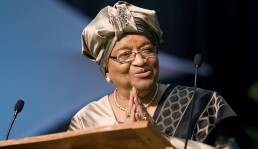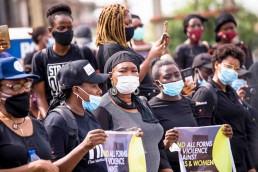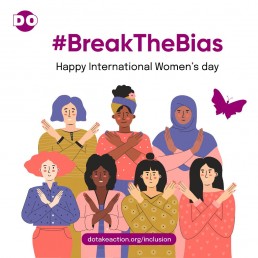Getting women a seat on Nigeria’s political table
Ellen Johnson Sirleaf secured herself a choice spot in African history when she was sworn in as the President of Liberia on 16th January 2006, becoming Africa’s first female president. Her two-term administration put an end to the siege of coups in the country, made elementary education free, ensured that Liberia’s $4.9 billion debt was cleared while pursuing a debt-free economy. Her administration was so successful that The Economist called her “arguably the best president Liberia has ever had,” while Newsweek listed her among the ten best leaders in the world.
Now, that’s a woman!
This is valid proof that involving women in politics holds great promises and could be the much-needed change in the political space we all crave in Nigeria and Africa.
Benefits of women in politics
Studies have proved that countries with greater involvement of women in their politics tend to fair better; this fact cuts across even the corporate space. A report by McKinsey Global Institute reveals that advancing gender parity could contribute $28 trillion at full potential, higher than the economic growth of China and India combined.
Women are natural-born managers. They are empathic, peaceful (not prone to war) and compassionate. These qualities considered weak in the medieval past are now the bedrock of 21st-century leadership. And true to character, women tend to bring these traits to their politics to evade war and foster peace while focusing their energy on solving people’s core needs. So, in a woman-led government, you get to see policies and initiatives to improve education, healthcare etc., and less investment in the military.
It is also common knowledge that when women are involved in peace talks, there is more likelihood to reach a compromise by the conflicting sides for sustainable peace. That is to say, if we had more women in power, maybe, just maybe, the wars happening around the globe would have been avoided, and people wouldn’t live in fear of bombshells and firepower from stronger powers.
Maybe what Nigeria needs is not another man who would promise ‘heaven on earth’ during campaigns and deliver ‘hell’ when elected into office. That has been the trajectory for the longest time in the history of Nigeria, and in extension, Africa.
A woman with a proven track record of effective leadership in public service and humane values could be what Nigeria needs to move into her promised land where all established systems are functional, the economy is thriving, and there are fewer talks of insurgency, killings and human rights abuse.
However, that is a long stretch because women still don’t have a voice in how things are run in Nigeria. In the last national election, women only held 7% of elected positions, one of the lowest in the world. The closest we have gotten is two acting female governors, not even elected. And that is grossly unfair, given that women constitute almost 50% of the total population of Nigeria.
Indeed, we no longer live in the dark ages when women did not have the right to vote and be voted into office. And yes, there has been an increase in the number of women in politics over the years. However, the positions they occupy are mostly ceremonial with no real power. More importantly, the major recipients of such offices are usually friends and allies of the powers that be, and as such, cannot drive the much-needed change or at least be relevant (a story for another day).
How come there are few women in Nigeria’s political terrain despite the overwhelmingly favourable prospects of having women in politics?
What is the real issue?
It is all traceable to the deep-seethed cultural and religious beliefs that a woman’s place is in the kitchen and the ‘other room.’ So, when a woman tries to raise her head and reach for more, she is confronted by this institutionalised mindset. This is why women who venture into politics find it hard to access robust funds as their male counterparts. The same is why women are not considered competent to hold strategic leadership positions even by their fellow women.
The matter is further worsened by the portrayal of women by the mainstream media as weak, indecisive, vain, frivolous and extravagant; this cripples the credibility of the prospects women in politics afford.
To crown it all, the cut-throat antics employed by men in politics to boycott and manipulate elections to their favour, are just so impregnable. Female politicians will need to play dirty or enter into despicable political fraternity to rise.
What can be done?
It’s important to recognise that achieving gender parity cannot be done overnight. There is a need for a concerted effort at the grassroots level by social, religious and political leaders to overcome culturally shaped mindsets that span generations. We need to galvanise parents, teachers, community leaders, employers, and others with social capital with the clear understanding that gender parity is not only the right thing but that it leads to greater social, economic and political success for Nigeria.
Another intervention that will ensure due representation of the female folk in Nigerian politics is to introduce a quota system at all levels of government, involving and engaging relevant stakeholders such as Independent National Electoral Commission and political parties to ensure strict adherence to it.
There should be a deployment of the national gender policy at all levels of government to ensure that at all times, the voices of women are heard where and when it matters. Even in the corporate space, employers should adopt laws, policies, and social norms that enable women’s social, economic, and political participation and provide equal opportunities for women and girls.
It is also important to recognise the institutional barriers that prevent women’s participation in politics, like lack of access to formal education, which is a precursor to accessing positions of power and decision-making. It will amount to a fundamental error to solely pursue the inclusion of women in politics without first addressing their educational access.
There should also be a coalition of women support and advocacy groups using NGOs and grassroots women associations to coordinate support and advocacy and provide capacity building for young women aspirants to enhance and develop them ahead of subsequent elections.
Finally, the mindset problem does not only affect the men-folk; it affects women too. Therefore, there is a need to deploy grassroots initiatives that will shift the mindset of women about how they see themselves and their abilities. NGOs and INGOs should organise leadership bootcamps in schools, religious organisations and social institutions to inform, train, equip, and inspire the girl-child to vie for leadership positions.
Here at DO, we have a leadership project targeted at enlightening communities on the benefits of women in leadership. She is a Leader Project is a one-day sensitisation workshop centred on holding discussions on the impact of women in politics and economic development and encouraging the active participation of young women in grassroots politics.
Join DO-Take Action and become a Grassroots Development Champion (GDC) to carry out She is a Leader workshop in your community and communities around you.
To become a GDC, click here.
You can also partner with us to sponsor the She is a Leader project. To become a DO partner, click here.
Join us as “we break the bias against women.”
Nigerian Lawmakers Rescind Rejected Pro-Women Policies: A Win or a Decoy?
Yesterday, amidst the simultaneous protest of Nigerian women in four states against the decision of lawmakers to reject pro-women policies on the grounds of religion, Nigeria’s lower house of parliament rescinded its rejection of three out of the five bills it discarded in the last constitutional amendment session. And to think that they came to that decision on International Women’s Day, I would say it is symbolic; proof that change is possible when the masses take pragmatic steps to assert their freedom.
Last week, the National Assembly rejected the said bills for no substantial reason, save religion. The bills intended to boost the autonomy of Nigerian women by granting citizenship to their foreign-born husbands, giving women the right to become indigenes of their husband’s state after five years of marriage, assigning 35% of legislative seats to women, reserving 35% of political party leadership for women, granting women affirmative action in party administration and leadership. These bills sought to mitigate the gender imbalance across the legislative arm of governments whilst reducing the under-representation of women in political office.
To think that the bills were dismissed on the grounds of religion begs the question, “What problem does religion have with gender equality?”
Dr Alaa Murabit, a medical doctor and a UN High-Level Commissioner on Health Employment & Economic Growth who also happens to be a Muslim, on an interview with WomenDeliver answered this question. According to her, her research on the role of women in Islam revealed that women were strong leaders who made significant contributions to their society politically, economically and militarily. So, she concluded that “it was not religion that was restrictive towards women; it was socially constructed cultural notions, veiled as religious dictate as determined by male religious actors with underlying political, social and economic benefits to themselves.”
And I dare say that her findings hold true across the different religions of the world. Religion is just another tool, like culture, being used to keep women relegated to the background.
That explains why there is only about 6% of women in the National Assembly despite 49% voting in the last election; to keep the voice of the Nigerian woman hushed, her gender equality demands checked, and her citizen status second-class.
That explains why Nigeria has never voted a woman governor or president; they give women glorified appointments to fulfil all righteousness but shut them out from the decision-making table.
That explains why women cannot easily access education and equal opportunities; so they cannot even qualify to wield real power.
Yes, the lawmakers have decided to revisit the bills in their next sitting, but who is to tell that the outcome will be in the favour of Nigerian women. This is why Nigerian women, activists and civil societies should not rest on their oars but should continue to press forward until gender equality or at least a semblance of it becomes a reality.
The next national election is around the corner.
What are the stakes for Nigerian women in politics?
Will the ugly narrative continue or are we going to see real change?
Will more women be seen in the Senate?
Are we going to see a female presidential candidate?
Pertinent questions!
I’d love to hear your opinion in the comment section.
Meanwhile, let us continue to “break the bias against women in politics.”
DO Celebrates Her Women on International Women's Day
It is International Women’s Day, a day set aside to celebrate the social, economic, cultural and political achievements of women – while also making a clarion call to break the bias against women.
This year’s celebration is centred on the theme “Break the bias.” The theme seeks to expose and advocate against biases women suffer in the corporate space, politics, social institutions, and even religious organisations.
However, this year’s celebration will not be complete without recognising and applauding the female movers and shakers of DO-Take Action who work tirelessly reach our goals and are committed to shooting us to the stars.
So, here it goes, in no particular order:

Meet Precious Ebere, co-founder and CEO of DO-Take Action.
Precious Ebere is an Education Technology Development Practitioner and Policy Analyst who uses data, policy, innovation, and technology to advocate for effective interventions that provide equal access to education and long-term learning outcomes for marginalised Nigerian children.
It is noteworthy to add that Precious is a Chevening scholar currently running a Master’s program in Social and Public Policy.
What does Precious do to blow off steam? She travels, meets and engages people.

Meet Favour Godwill, program manager, Do Take Action.
From age 12, Favour has always been interested in programs that focus on the development of individuals and communities. She has extensive experience in advocacy, project management, strategic planning, research and development, and communication for the growth and development of children and young adults, including access to quality health care, quality education, youth leadership, and sexual and gender-based violence against women, children, and internally displaced people.
Favour is also a writer, and she utilizes her writing to question the narrative and shift negative paradigms in her community.
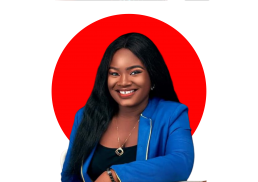
Meet Chiamaka Glory Jonathan, a Program Manager at DO Take Action.
Chiamaka Glory is a Public Health Practitioner and also an entrepreneur. She is a recipient of the Outstanding Volunteers Award 2020 by United Nations Volunteers Program Nigeria, she is a YALI RLC West Africa Fellow, a Savvy Fellow, an Ambassador of the Nigerian Prize for Leadership Program and Street Project Foundation.
Chiamaka Glory is interested in leadership and community service because she believes in giving back to her society and to that effect, she has trained 2204 women and girls across Nigeria, Ghana, Ivory Coast and Cameroon on hat making.
Chiamaka Glory loves singing and listening to music.
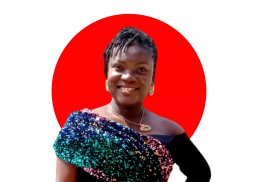
Meet Chiamka Ada Pius, a Programs Manager at DO-Take Action. Chiamaka is an experienced Programs Administrator, Humanitarian and Social Worker passionate about advocating for women, girls and human justice, well being, education, equity and mental emancipation.
Chiamaka is a member; the International Society for Substance Use Professionals, the Nigerian Association of Social Workers, the International Association of Public Health Logisticians, the Nigerian Red Cross Society and the Young African Leaders Initiative.
Chiamaka enjoys meeting and interacting with people, travelling, playing games and listening to music.
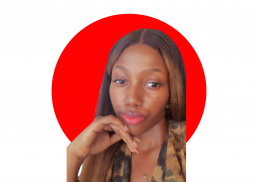
Meet Opeyemi Temini Oyesola, the Digital storyteller at DO-Take Action.
Opeyemi oversees DO’s interactions with the public by implementing social media platforms’ content strategies. She desires to tell insightful stories about the various issues in our communities to inspire change. She is a dreamer, she is a believer and a Changemaker.

Meet Uzoma Ezeson, the Communications Strategist at DO-Take Action. Uzoma is the brain behind the rich content you enjoy on the DO website, blog and public relations. She is responsible for managing and improving DO’s communication channels while projecting a positive image of DO consistent with the brand’s core values. When she’s not working, she enjoys reading and engaging in meaningful conversations around her areas of interest.
And of course, we celebrate all the female Grassroots Development Champions (GDCs) driving sustainable change in their respective communities. The list is just too much to pen down.
We love your work.
We value you all.
We wish you Happy International Women’s Day.
Let’s break the bias against women.
